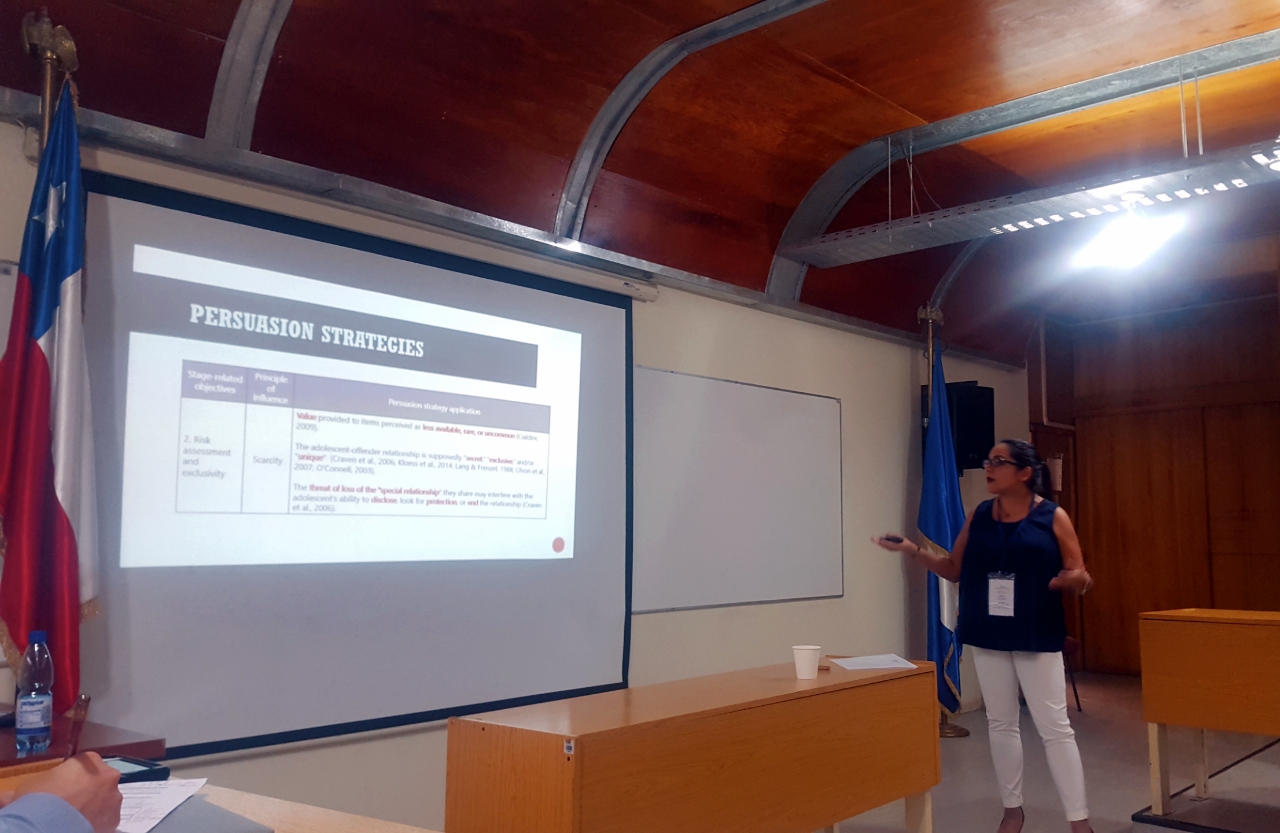Collective Consciousness
Lorena Levano, a graduate student in the College of Liberal and Professional Studies, uses collective social behavior to address sexual harassment and online grooming.
A picture of women protesting sexual violence in Peru flashes onto the screen. Seconds later it is juxtaposed against a shot of the 2018 Women's March on Philadelphia. “This is not a local problem,” states Lorena Levano, matter-of-fact, as she proceeds to deliver her award-winning presentation at the 2019 Grad Ben Talks, an event where Arts and Sciences graduate students present research in TED Talk fashion.
Levano, a graduate student in the College of Liberal and Professional Studies, is just as passionate about her research in a one-on-one interview. “How do you define sexual harassment?" she asks. “A lot of people don't realize it, but all it takes for someone to feel unsafe is the simple sharing of a photo.”
Just as sexual harassment isn’t limited geographically, or to a specific behavior, it also isn’t limited to a given age group, Levano says. “When it comes to harassment, we usually think about the workplace and public transportation—and we usually think about adults. But this is a problem that affects kids, too. Seven out of 10 girls in the U.S. are sexually harassed at some point in high school. It interferes with the right to receive equal educational opportunity.”
Levano’s paper, “Using a Social Norms Framework to Study Latino Youth Beliefs about Sexual Harassment in High Schools,” which was accepted into the 2019 World Anti-Bullying Forum, seeks to address harassment from a unique angle.
“While studies about sexual harassment in schools exist, few of them consider social conditionality,” says Levano, who was awarded a 2018/19 Graduate and Professional Student Assembly-Provost Fellowship Award, which helps to support the project. “It’s not as simple as bad kids behaving badly. Many times they are pushed by the expectations of others. This is especially true of boys who think a certain type of behavior makes them cool. The consequences are psycho-social and psycho–emotional. Kids stop wanting to come to school, or experience anger and fear. They sometimes even experience physical effects, like headaches.”
Levano is quick to point out that sexual harassment does not discriminate when it comes to gender. Boys encounter harassment, as well, but often feel as if they have fewer options when it comes to reporting it. “One boy who wrote about his experience said, ‘These girls talk about me in inappropriate ways, and find ways to make physical contact. I really don’t like it, and no one is going to stop it because I am a guy.’”
Levano is conducting her research in Rhode Island schools in partnership with Young Voices, a state-wide organization that empowers youth to become confident civic leaders and advocates in their communities. She plans to carry out a survey of social norms.
“When it comes to social norms, behavior manifests in the collective as both ‘What I believe others do,’ but also ‘What I believe others think I should do,’” says Levano. “So the best way to address this is to promote coordinated change like informational classes or campaigns with statements like, ‘Sexual harassment is not a joke.’ You must consider the reasons behind the behavior.”
In addition to research on sexual harassment, Levano is hard at work on a sister project titled “Understanding the Role of Trust in Online Grooming.” The project saw Levano travelling to the Second Latin-American Workshop on Experimental and Behavioural Social Sciences (LAWEBESS) at University of Santiago in Chile this past December to present on her research.
“Due to the rise of internet use among young people, there are a lot of unusual risks and new forms of violence, like online grooming,” Levano says. She defines grooming as the process in which an adult uses cyber technology to develop a relationship with the goal of sexual abuse.
“As a teenager, you have a lot of requests by men who want to talk to you. Whether purposeful or not, a lot of younger people post pictures with sexually-suggestive content, or they make a lot of comments about sexual things just to gain more likes,” Levano says. “And a lot of the people that comment on these pictures are adults. And if this is what is happening in kids’ public timeline on Facebook, then you have to ask yourself, what is happening in their inbox?”
Levano, who is originally from Lima, Peru, saw these predatory practices at play when she was a volunteer at a children’s shelter there.
“It's not just the shelter kids. It's not just a poverty problem. It's a problem for all kids that are on the internet without any guidance,” says Levano.
Levano, who plans to return to her job at the Ministry of Education in Peru when she completes her degree, hopes to apply her research to affect policy by building a theoretical framework to better explain the role of trust in the effectiveness of the influence strategies used in online grooming.
“The best cure is always prevention,” Levano says.




